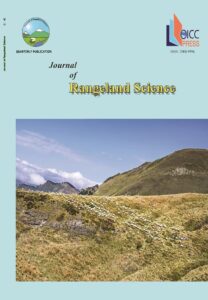Assessment of Range Health Changes in Zagros Semi-Arid Rangelands, Iran (Case Study: Chalghafa- Semirom-Isfahan)
Authors
Abstract
Rangeland health assessment provides qualitative information on ecosystem
attributes. We examined changes in rangeland health in the Zagros semi-arid rangelands of
Iran at fixed sites between 2001 and 2011, over the 10-year period. The rangeland
fragments significantly declines in the quality of the vegetation, and changes in plant
species were driven largely by seasonality, and to a lesser extent, amount of rainfall. Three
indices of rangelands health (composition, function and stability) developed using sitebased
vegetation and landscape data. The results indicated that the majority of sites had
intermediate values of the three indices, and few sites had either very low or very high
values. The indices of composition and function were strongly correlated with the
subjective ratings applied to each site at each measurement period. The results of this study
highlight the difficulty of detecting change over extensive areas of rangeland, and of
separating management induced effects from climatic effects in an environment which
experiences wide spatial and temporal variation in rainfall. Results showed that soil surface
resistance decrease and water flow pattern degradation were the most important causes in
rangeland health decrease. Although, Chalghafa rangelands have enough rain falls to
support habitation, humans had degraded the landscape. Moderate grazing is the best way
to use the grazing land without severe reduction in abundance and biomass of species.


